By Jeremy Rhodes
The first wave of data released from the 2020 US Census is here, and many of the demographic shifts that we’ve seen across the country and the state are mirrored in our Waco community. In this series of posts, I am presenting some of the demographic changes we see in our county from 2010 to 2020. The first post presented numbers regarding general population growth and decline. This second post will show an overview of racial and ethnic changes in the county.
The census website advises caution when comparing the racial and ethnic composition of 2010 to that of 2020. According to their website, “data comparisons between the 2020 Census and 2010 Census race data should be made with caution, taking into account the improvements we have made to the Hispanic origin and race questions and the ways we code what people tell us.”
With that caveat in mind, from 2010 to 2020, the U.S. saw the most dramatic growth among two racial and ethnic groups: Latinos and multiracial people. The U.S. saw a 23% increase in Latinos, while the state of Texas saw a 21% increase in Latinos. In McLennan County, the Latino population increased by 23.6%, or an addition of 13,116 people. Multiracial Americans also saw significant growth throughout much of the United States. In McLennan County, multiracial people now make up 11.8% of the population, which is an increase of 428.6%.
The following table shows a more detailed racial and ethnic makeup for the county, in comparison to Texas and the entire U.S.
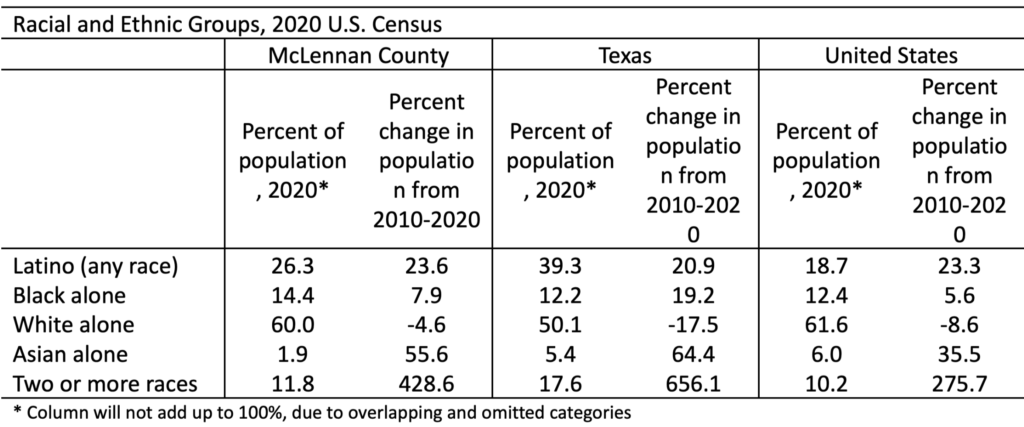
The tremendous growth of multiracial people is caused by multiple factors. The most obvious factor has to do with lessening stigma against interracial relationships. As we come to see more and more interracial pairings, we will have more biracial children being born.
Second, the Census Bureau has improved the way they ask the race/ethnicity question by creating two separate questions for race and ethnicity, which experts believe will provide a more accurate portrait of how people identify (this change is expected to also improve our count of Latinos in America).
Third, there is evidence that multiracial individuals are more willing to identify as such than in the past. For example, a person who has one Black parent and one Latino parent is now less likely to choose between those two identities, and more likely to identify as both.
The next post in this series will display maps that show where we have seen the growth and decline for specific racial/ethnic groups in Waco. If you have any questions about this, or if you would like Jeremy to give an overview of these changes to your group, staff, or organization through Zoom or in person, please contact Jeremy Rhodes at [email protected].

Jeremy Rhodes, Ph.D., is director of research and community impact for Prosper Waco.
The Act Locally Waco blog publishes posts with a connection to these aspirations for Waco. If you are interested in writing for the Act Locally Waco Blog, please email Ferrell Foster at [email protected].
By Dexter Hall
There are many different approaches or levers that must be pulled to ensure an inclusive economy for all Wacoans.
The question, of course, is which levers will we pull to provide the financial economic security for all of our citizens or will we adopt a “throw spaghetti against the wall” approach and see what sticks.
Varying organizations and institutions across the nation compile numerous reports to show what is and what is not working. We know the lessons of the past and the intentional levers that were pulled to create an unequal economy leaving our BIPOC (Black, Indigenous, and other people of color) communities to suffer in poverty.
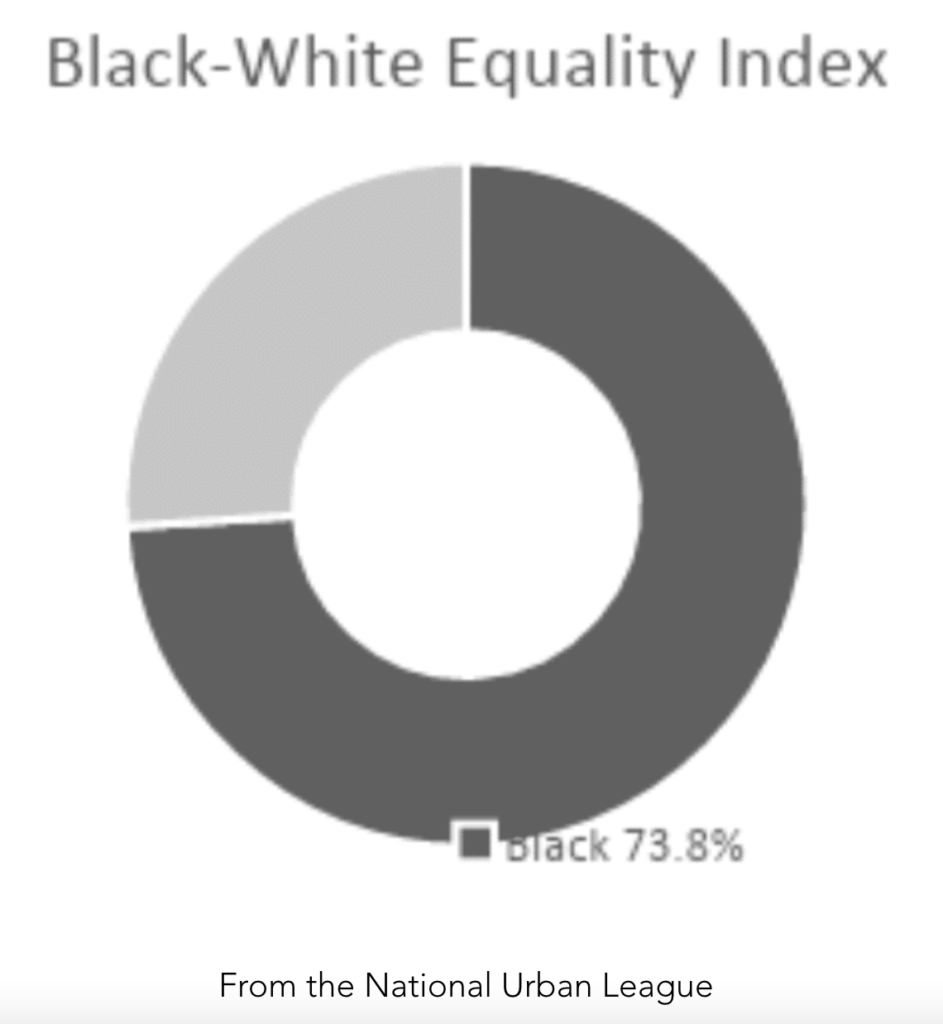
The National Urban League’s “2020 State of Black America: Unmasked” report, shows a Black-Equality Index of 73.8 indicating Black Americans are missing 26% of the pie. The same index shows Hispanic Americans at 78.8 indicating they are missing 21% of the pie.
The overall Equality Index is made up of the five areas with each being weighted based upon urgent need and importance. The chart below shows where Black Americans ended in 2020. The 59.2% index in economics shows Black Americans are missing almost half of the economic pie in comparison to White Americans.
On May 26 this year, Prosper Waco hosted “Addressing Financial Empowerment: Waco Prospers when All Wacoans Prosper.” I had the awesome opportunity to share with our mayor and other community leaders the levers that Prosper Waco would be pulling to move toward ensuring the economic and financial security for all Wacoans.
Through the work of the City of Waco’s Financial Empowerment Blueprint, we shared intentional strategies in the areas of Asset Building, Banking Access, Consumer Financial Protection, Financial Education, and Small Business Development and Financing.
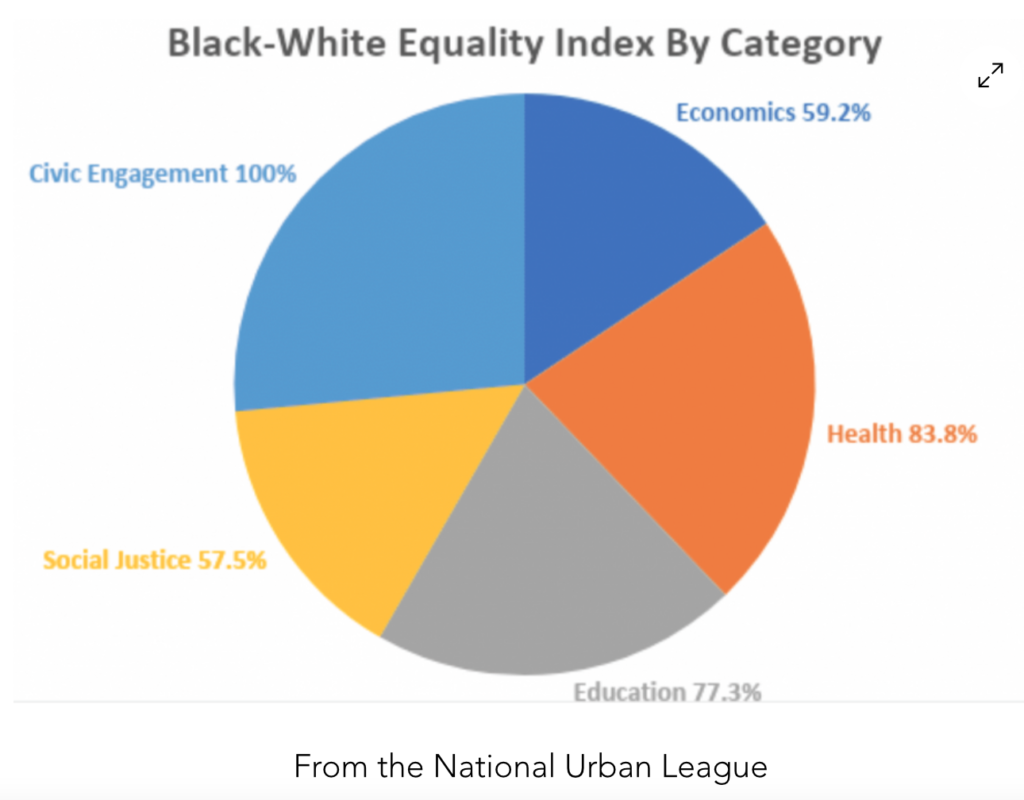
In each area we shared a plan of work that we would be initiating or that was being done through partner organizations in our community that addressed the needs of our low-to-moderate income (LMI) community and small business owners.
We are grateful to work with individuals and organizations in developing specific intentional work to address the needs of all Wacoans and ensure an inclusive economy in our area.
Instead of throwing spaghetti against the wall and hoping something sticks, we are partnering and working together to address immediate needs as well as short- and long-term needs of our community through intentional drivers that led to the 73.8 score in the National Urban League’s Black-White Equality Index.
Working together we can build the right spaghetti and meatballs for all Wacoans to prosper equally and equitably.
And, by the way, who likes spaghetti without meatballs?
Join us in the work for financial and economic security for all Wacoans by adding your sauce to this intentional spaghetti.
How can you help?
Volunteer your skill or experience in financial or legal services.
Donate to support the various initiatives in each area of focus.
Sponsor Financial Education Workshops for your groups, employees, associations, clubs, sororities, and fraternities.
If you would like to help or invest in supporting the financial and economic security for all Wacoans please contact me at [email protected].
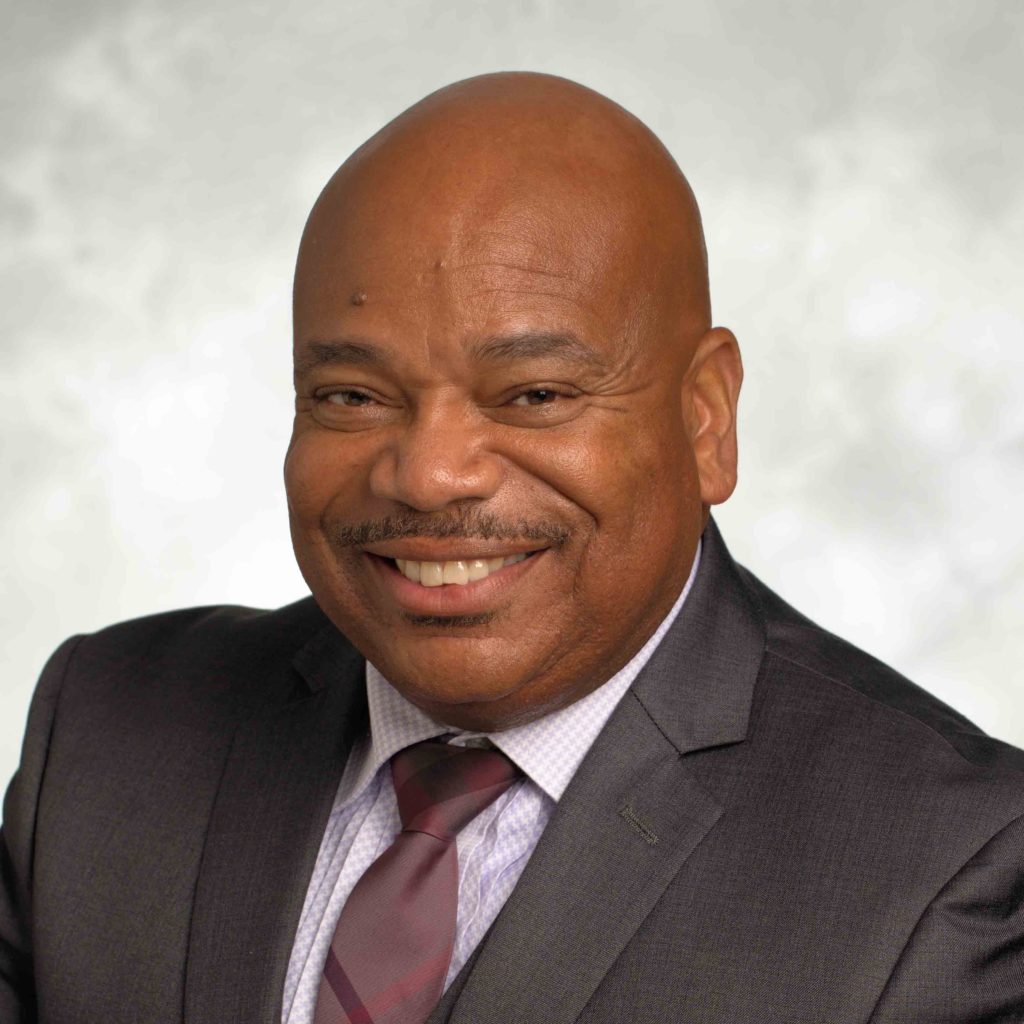
Dexter Hall is chief of staff and senior content specialist for financial security with Prosper Waco. For more information on financial security contact Hall at [email protected].
The Act Locally Waco blog publishes posts with a connection to these aspirations for Waco. If you are interested in writing for the Act Locally Waco Blog, please email Ferrell Foster at [email protected].
Meraki Medical Associates LLP will begin offering COVID-19 vaccinations Friday, Aug. 20, at 1001 Dunbar Street in East Waco. The opening is planned in conjunction with August being National Immunization Awareness Month.

CEO Sophia Strother formed Meraki “to create access and awareness for communities of color in the East Waco,” she said. Meraki is Greek for doing something with soul, creativity, and love. “It’s important to always put something of yourself into what you’re doing, whatever it may be. We are a starting point for the sustained health of our community. We will be known for our compassion and ability to provide services to everyone we encounter with meraki.”
Strother is passionate about helping communities of color fight against COVID. After having over 10 family members directly affected by the virus, she decided she needed to take action. Partnering with Living Word Church of God in Christ, Meraki is set to open its clinic Aug. 20 to provide community-focused health awareness on the importance of vaccine-preventable diseases. It will provide vaccination clinics and educational opportunities statewide that will target underserved communities and special populations.
Meraki is at 1001 Dunbar St., Waco. This building has housed Living Word Church of God in Christ, Meals on Wheels, and Community Food Pantry for all of 20 years. Meraki believes “every person deserves an opportunity to be given a health experience that inspires them and enhances their quality of life. The team hopes to partner with other faith-based organizations, community organizations and corporations to administer vaccinations to individuals 16 years and older.” Sophia is passionate about helping others through faith, knowledge, and resources.
Aug. 20 Events at Meraki
11 a.m. – 11:30 a.m. – Tour
11:30am – noon – Press Conference
Noon – 2 p.m. – Vaccination Clinic
Strother also owns a logistics company and was recently featured on HGTV’s “40 Year Old Property Virgin.” Connect with Sophia online here.
The Act Locally Waco blog publishes posts with a connection to these aspirations for Waco. If you are interested in writing for the Act Locally Waco Blog, please email Ferrell Foster at [email protected].
By Dr. Peaches Henry
I grew up in Palestine, about two hours due east of Waco, where Juneteenth was a huge holiday in the Black community and in my family as well.
Abraham Lincoln’s Emancipation Proclamation became effective Jan. 1, 1863, declaring “that all enslaved persons in the Confederate States of America in rebellion and not in Union hands were freed.” Yet, it was not until two years later, June 19, 1865, that enslaved people in Texas heard the news of their freedom in Galveston. One year later, the first Juneteenth or Jubilee Day was celebrated. Celebrations continue in Texas and across the nation.
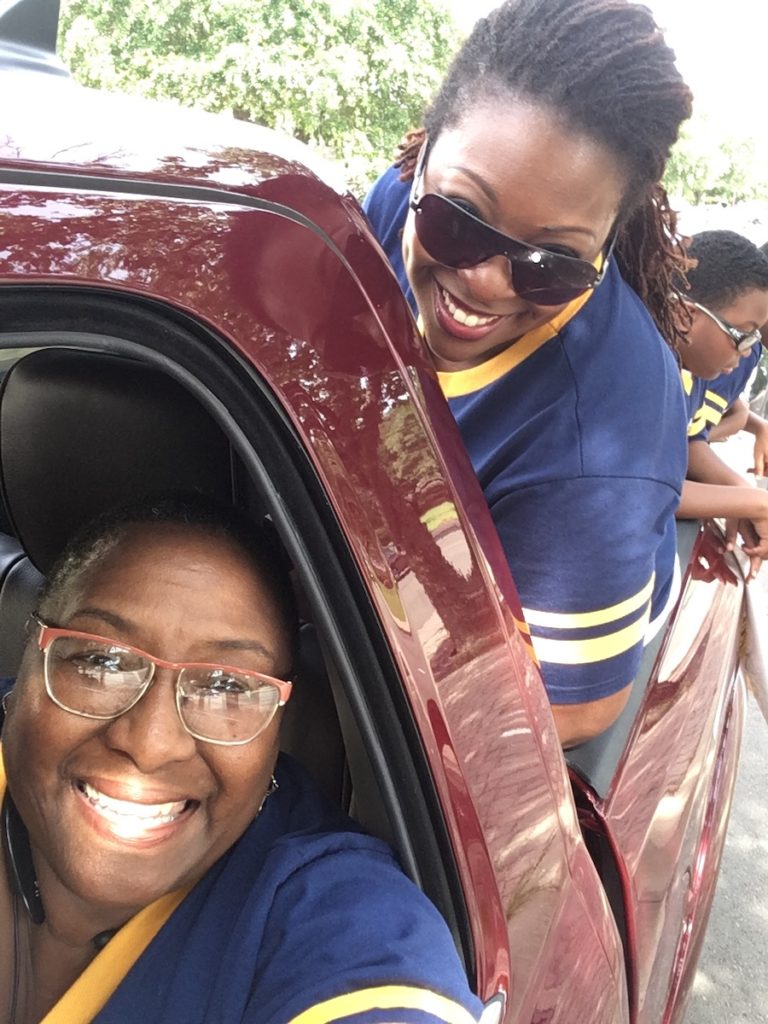
From my earliest days, I remember my family celebrating Juneteenth with a huge family celebration. The birthdays of a great aunt and great uncle sandwiched the holiday falling on June 18 and 20. For years, I thought it was so great that the whole county celebrated Aunt Lila’s and Uncle Monroe’s birthdays.
My extended family on my mama’s side would head out to the country home of Aunt Lila and Uncle Monroe on Juneteenth. Kinfolk from the big cities of Dallas, Fort Worth, and Houston drove in. Grownup cousins who had moved away from Palestine came back to show off their sophistication.
The men would stay up all night barbecuing briskets, ribs, links, and chicken. The women would bring homemade pound cakes, teacakes, sweet potato pies, and peach cobblers along with fried chicken, turnip and collard greens, potato salad, pinto beans, homemade biscuits, and cornbread. Red cream soda and whatever it was that the menfolk had in those brown paper bags out by the pit were the drinks of choice.
The children would go out into the watermelon patch using the “thump” technique to select the ripest and sweetest melons possible. And of course, there was a chocolate birthday cake to mark the birthdays of Aunt Lila and Uncle Monroe. There was always a prayer — over the food, over the family, over the children.
The family spent the day visiting and catching up on everyone’s lives. The great-great aunts, great-aunts, and regular aunts made the kids’ lives a misery with sloppy, loving kisses and mushy bosom hugs that we endured, because they were followed by nickels and dimes pulled from the knotted corners of handkerchiefs.
Kids roamed the still working farm riding the old horse who pulled my uncle’s plow, bothering the chickens in the coup looking for eggs to collect, hiking into the nearby woods, playing baseball with rocks for bases, and grabbing a chicken leg here or a slice of melon there. My big mama and her sister, the birthday girl, circled up under a shade tree (there was no air-conditioning on the farm) with their daughters my mama, her sisters, and first and second cousins, and they traded family gossip (warning us kids away from listening to “grown folk” talk with looks that could freeze Kool-Aid.)
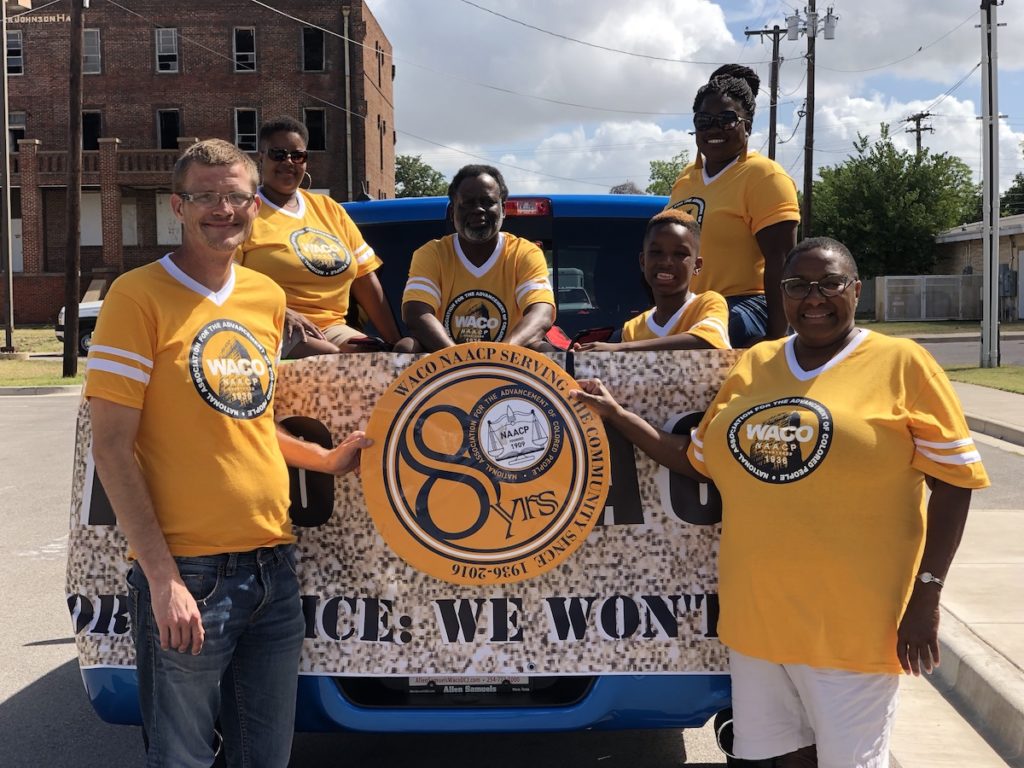
The men gathered under a different shade tree to play dominoes — loud, table hitting, trash-talking dominoes. I thrilled to witness these matches and was delighted when I was given the job of keeping score. I sat between my two favorite uncles (who I learned as an adult were not uncles but second cousins) and kept score like I was scorekeeper for the World Series.
At the end of the day, parents gathered up tired children, wiped as much dirt and food off them as possible, kissed everyone goodbye, and promised to see everyone next Juneteenth (“if the Lord say the same”). On the 20-minute trip back to town (after all, Palestine was the county seat), we three kids would fall asleep to my parents re-hashing all the family gossip my mama had collected. Year after year, I grew up to the predictable rhythms of these Juneteenth celebrations.
Imagine my surprise when I arrived at the University of Texas at Austin to discover that my mostly white classmates had no idea what Juneteenth was or what it celebrated and commemorated. I considered their ignorance their loss and returned to Palestine throughout my undergrad years to celebrate Juneteenth at Aunt Lila’s and Uncle Monroe’s farm.
I was more forgiving of my grad school classmates. Afterall, they were northerners and not expected to understand Texas culture. I patiently explained Juneteenth to them and invited them to celebrate with me in Central Park.
Somewhere along the way, Juneteenth became a national holiday with African Americans around the country celebrating the day possibly as a result of transplanted Texans marking it. Even communities whose celebrations have diminished over the decades have been revived.
The holiday is now marked with picnics, parades, service projects, and Ms./Mr. Juneteenth pageants. In 2020, Juneteenth was observed with protests for social justice. Wacoans have been celebrating Juneteenth for decades and have revived the holiday in recent years with participation in events steadily increasing.
A measure of the holiday’s new status is evident in a feature story on Juneteenth pageants in the The New York Times. The 2020 film, “Miss Juneteenth,” directed by Channing Godfrey Peoples, is being re-released in theaters this week. And wonder of wonders, both the United States Senate and the House of Representatives passed legislation making Juneteenth a national holiday; the bill heads to President Biden’s desk to be signed into law in time for Juneteenth on Saturday.
At the local level, City Councilwoman Andrea Barefield is working on making Juneteenth a legal city holiday.
Juneteenth gives us a moment to reflect on our ability as a country to course correct as we move toward the promise enshrined in the document of our other Freedom Day that all people “are created equal, that they are endowed by their Creator with certain unalienable Rights, that among these are Life, Liberty and the pursuit of Happiness.”
Let us celebrate!
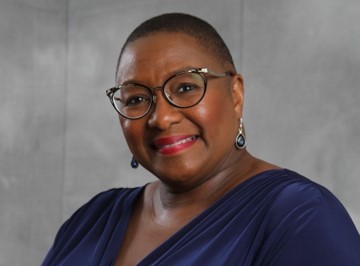
Peaches Henry is president of the Waco NAACP and an English professor at McLennan Community College. She is the proud mother of Corey Henry, who is practicing law in New York. She is currently training her two-year old Juneteenth-born Black lab Samson.
The Act Locally Waco blog publishes posts with a connection to these aspirations for Waco. If you are interested in writing for the Act Locally Waco Blog, please email Ferrell Foster at [email protected].

Special from The Anchor News
By Linda Crawford
Thirty-year-old businesswoman TeAnnah Shields says her business success derives from her consistency, professionalism, and quality of work.

“I have been braiding about 19 years,” said Shields, owner of The BeauTee Room, 121 N. Hewitt Dr., Suite B, in Hewitt. That’s half of her life. Eleven years old? Twelve? Talk about a lifetime of experience! That would be TeAnnah!
“As a child, I loved doing my sisters’ hair and babysitting because I got to play in the children’s hair.”
At that time, doing hair was a hobby for Shields. While many children played with dolls and two dishes, she played with hair. “Money was not an incentive for me. I simply and genuinely enjoyed doing hair.”
“It was always so satisfying,” she explained. During Shields’s teenage years, her mom would allow friends from school and a few adults to come over to get their hair braided.
“Imagine being a 13-year-old child having an adult client come from McGregor to Waco to get her hair braided,” laughed Shields.
Through the years, it became apparent that Shields had a gift, but wanting the best for her, teachers and family members were adamant about a career that included college.
“I know they wanted the best for me, and I did too. I honestly did not see myself as a full-time braider.”
Thus, such a business or career was never part of her plan. After she graduated from high school, of course, she attended college. Her education prepared her to become a dental assistant, but after working in this field for three years, she was laid off.
It was at that time that Shields used her God-given talent to make ends meet. Yes, God has a way of leading us right to his plan. Still, even in those trying times, it never occurred to her that God was positioning her to start a full-time business, perhaps for life. The old adage says, “The third time is a charm.” Shields worked a few other jobs but always found herself returning to her old love — braiding.
“It was the third time but this time, it stuck, explained Shields.
“I became overwhelmed with working a full-time job, braiding, and being a parent to my three chidlren. I soon stepped out on faith and became a full-time braider and later, a salon owner.”
According to Shields, when people come to her salon, “they enjoy the styles, vibes, and good energy there. The BeauTee Room is clean, fresh, and well-equipped to make customers come back again and again. After four years of braiding fulltime, Shields has a reputation of being the best. Clients book at least 30 days in advance and come from as far as two hours away.
Shields is now thinking about opening a second location with technicians whom she has trained to mock her work. Hours of operation vary and are by appointment only.
Prices range from simple styles like two braids for $45 to box braids for up to $300.
For more information or to book an appointment, call (254) 265-0433.
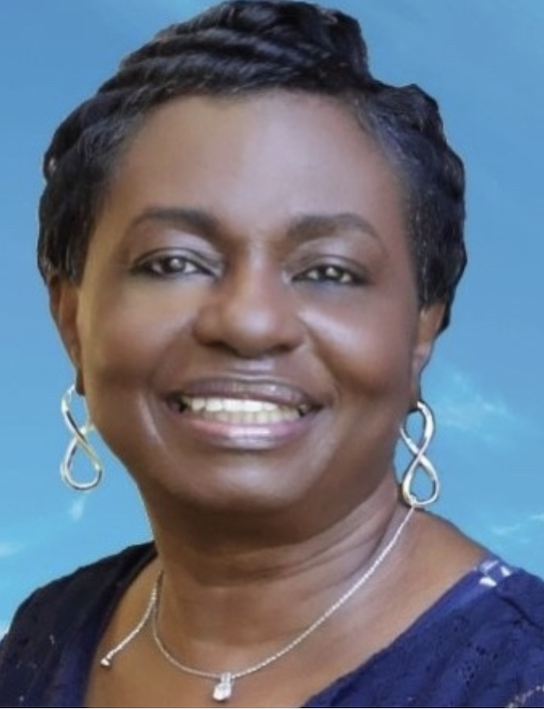
Linda Crawford, owner of The Anchor News, is an English professor at McLennan Community College, a motivational speaker, and author of the book, God, Destiny and a Glass of Wine (available on Amazon).
The Act Locally Waco blog publishes posts with a connection to these aspirations for Waco. If you are interested in writing for the Act Locally Waco Blog, please email Ferrell Foster at [email protected].

This article was originally published in the March 2021 issue of The Anchor News. The Anchor News is a free, monthly publication of Crawford Publishing. The Anchor News is dedicated to serving the community and surrounding area, focusing on positive news and accomplishments of minorities. For more information about The Anchor News including how to subscribe or where to pick up a copy, please visit The Anchor News website.
The Act Locally Waco blog publishes posts with a connection to these aspirations for Waco. If you are interested in writing for the Act Locally Waco Blog, please email Ferrell Foster at [email protected].

Special from The Anchor News
By Linda Davis
As a child I was fascinated with dance. I enjoyed watching anything on TV that involved twirling and flipping, such as figure skating, gymnastics, tap dancing, and, of course, music videos.
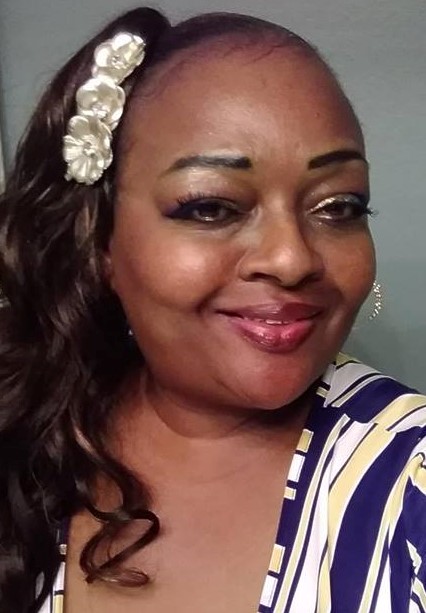
By far, “Fame,” a 1980s popular television show starring Debbie Allen as an inner-city dance instructor, was my favorite evening show. Can you picture me, as a 10-year-old plump, brown-skin girl with pigtails dangling, dressed in tights with leg warmers, dancing around the living room with dreams of being cast in the show’s next season?
Unfortunately, 40 years ago many Black girls had dreams that were never fulfilled because there were not many images of African American athletes showcased in the media. The idea didn’t have parental support.
It’s very important for children to be exposed to positive images that raise their curiosity and spark their interest, which foster dreams leadings to goals and success. Sometimes, it’s hard for one to have a dream he/she has never seen demonstrated through the actions of others.
Today, things are looking up! We have many African American women with various high-ranking occupations and careers portrayed in the media for the whole world to see. Madame Vice President Kamala Harris! Need I say more?
Our young children can dream their biggest dream. Former President Barrack Obama and Vice President Harris have raised the bar to the highest level. How great it is to be an African American child during this time. The sky is the limit. There are no restrictions or limitations placed on their desire to reach their full potential.
Many once viewed African American women as the laser gender of minorities. However, women like Michelle Obama (author, lawyer, and the first Black First Lade of the United States); Oprah Winfrey (journalist and talk show host); and Stacie Abrams (influencer and political guru), just to name a few, are famous Black women who have put that lie to rest.
With the hit TV shows, “Grey’s Anatomy,” “Scandal,” and “How to Get Away with Murder,” Shonda Rhimes, producer, screenwriter, and author, has stepped into the limelight along with athletes such as Gabby Douglas, a well-known Olympic gymnast, and Misty Copeland, a world-know ballerina.
Do you have a daughter who has big dreams? Dream the dream with her. Don’t let it die! As parents, grandparents, neighbors, and friends, it’s up to us to help our little brown girl achieve their dreams.
Linda Davis, owner of Pampered Babies, is a caregiver with over two decades of childcare experience. Pampered Babies nursery is a registered home with Texas DHS, 2705 Windsor Ave., in the historic North Waco neighborhood of Dean Highland.

This article was originally published in the February 2021 issue of The Anchor News. The Anchor News is a free, monthly publication of Crawford Publishing. The Anchor News is dedicated to serving the community and surrounding area, focusing on positive news and accomplishments of minorities. For more information about The Anchor News including how to subscribe or where to pick up a copy, please visit The Anchor News website.
The Act Locally Waco blog publishes posts with a connection to these aspirations for Waco. If you are interested in writing for the Act Locally Waco Blog, please email Ferrell Foster at [email protected].
In honor of Black History Month, we are featuring interviews with local Black community leaders. These pieces were written by Baylor University students from the Department of Journalism, Public Relations, and New Media. The students asked questions about what the leaders love about Waco, and we are excited to share their responses with you this month.
By Lauren Combs
Lakia Scott, assistant professor of curriculum and instruction with Baylor University’s School of Education, pursues research alongside teaching undergraduate and graduate students. She decided to dedicate her research to improve urban literacy.
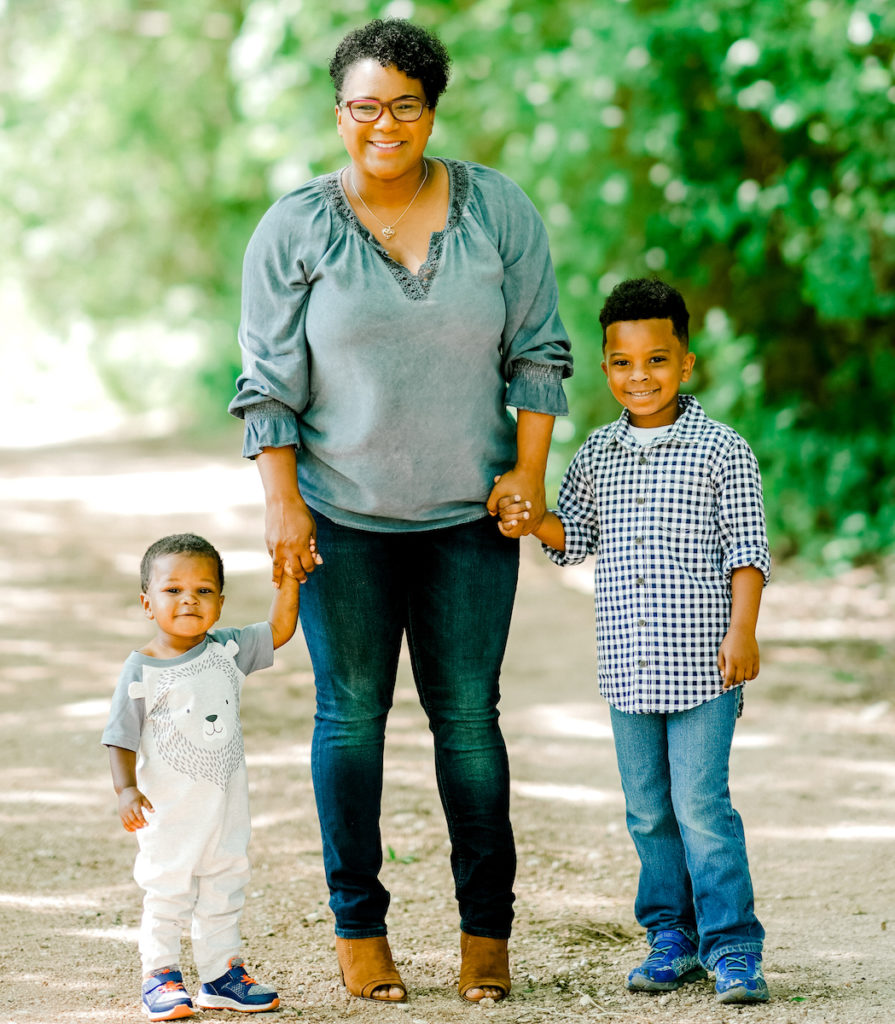
“My research for the last three years has been on the Freedom Schools program,” Scott said, “and that is a summer literacy initiative that is sponsored by the Children’s Defense Fund that helps to lessen summer reading loss.”
Scott said students who don’t have access to resources like summer enrichment programs or tutoring opportunities typically fall six to nine months behind before returning to school in the fall.
“They’re actually returning to school as if they are in the mid-year of their previous academic school year,” Scott said. The program she created and continues in partnership with the CDF model seeks to “reduce that learning loss, that summer reading gap, so that students can go back to school in a better frame of mind academically.”
Scott said the Freedom Schools program uses culturally relevant texts at all levels that are developmentally appropriate to increase students’ exposure to reading. The students have three different opportunities to engage with texts throughout the day.
“They’ve become more fluent readers. They also build comprehension skills because they’re reading things they really, really care about, and that makes all the difference,” Scott said. “Whereas a sixth grader may come to me on a fluent reading level of fourth grade or right under fifth grade, they may leave Freedom Schools in a 30-day time span over the course of two months at a seventh grade level.”
Scott said the students who participate in this program are also positively impacted because they are appreciative of reading, academically motivated, and likely to become leaders in their classrooms and communities.
“I know reading is only one of those core subjects taught,” Scott said, “but reading is seen in every other subject. And so if we don’t equip our students with those foundational literacy skills, it has long-term impacts.”
Waco ISD has a reading proficiency of 30%, which means 30% of the students in the district are reading at or above grade level. “My goal, if I were able to cast this larger vision for the City of Waco, would be to see that reading percentage increase exponentially to the 90 percentage range,” Scott said.
Scott said the community has already been doing a lot to help achieve this goal, but she would like to continue to see community members making their presence known in the schools with opportunities like mentoring programs. She also encourages sororities, fraternities and other service-based organizations to continue being advocates in school settings. However, Scott also said there are other, less direct way to increase the literacy levels.
“Something that I think is really overlooked is attending school board meetings. The presence of community members at school board meetings is powerful because so much happens there— the ways budgets are allocated, the ways resources are allocated— all of those things are talked about and discussed and voted upon at the school board level,” Scott said.
Scott even encouraged community members to run for school board positions and community leadership opportunities.
“If we are really serious about making change in ways that are going to positively affect the students that are in the community,” Scott said, “we need to be more vocal about it.”
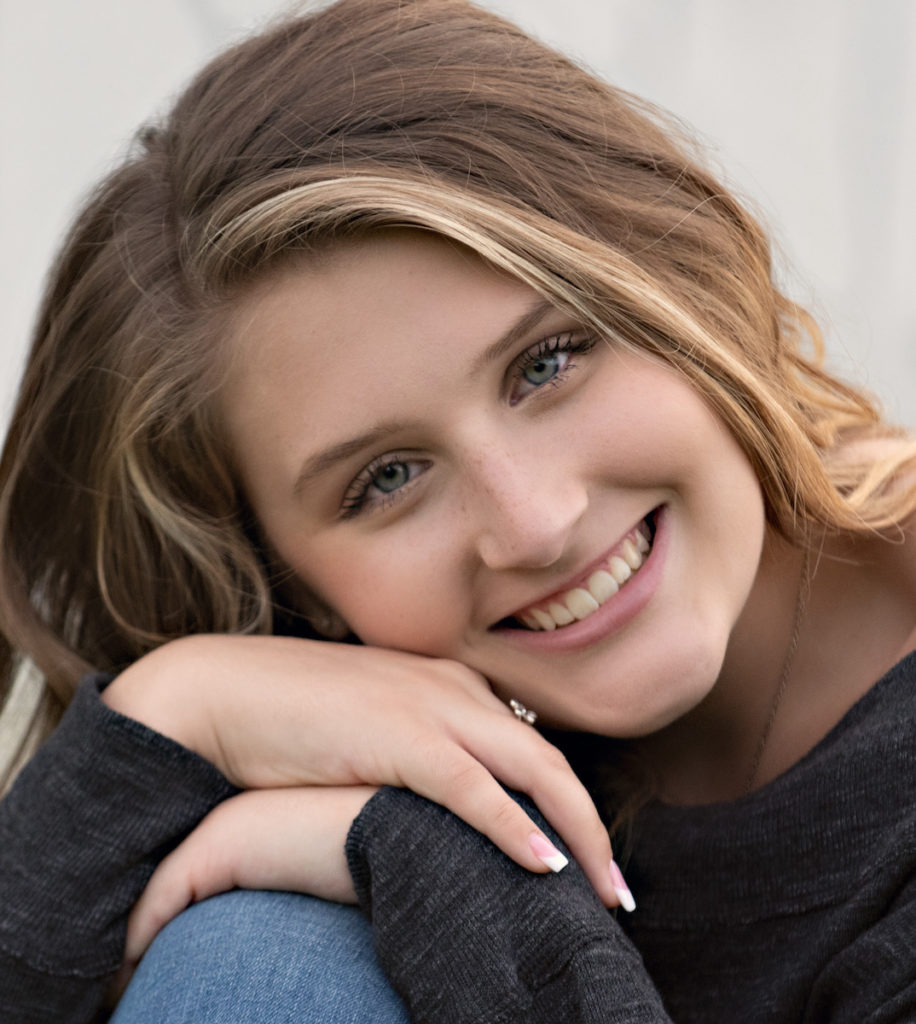
Lauren Combs is a Baylor University sophomore from Virginia majoring in journalism who hopes to pursue magazine writing or public relations for nonprofits or ministries.
The Act Locally Waco blog publishes posts with a connection to these aspirations for Waco. If you are interested in writing for the Act Locally Waco Blog, please email Ferrell Foster at [email protected].
In honor of Black History Month, we are featuring interviews with local Black community leaders. These pieces were written by Baylor University students from the Department of Journalism, Public Relations, and New Media. The students asked questions about what the leaders love about Waco, and we are excited to share their responses with you this month.
By Skylla Mumana
For many new to the area, and even some long-term residents, navigating the city may prove difficult and finding things to do may seem even harder. However, local figures such as 38-year-old Shamica Evans are proving that the city has so much to offer.
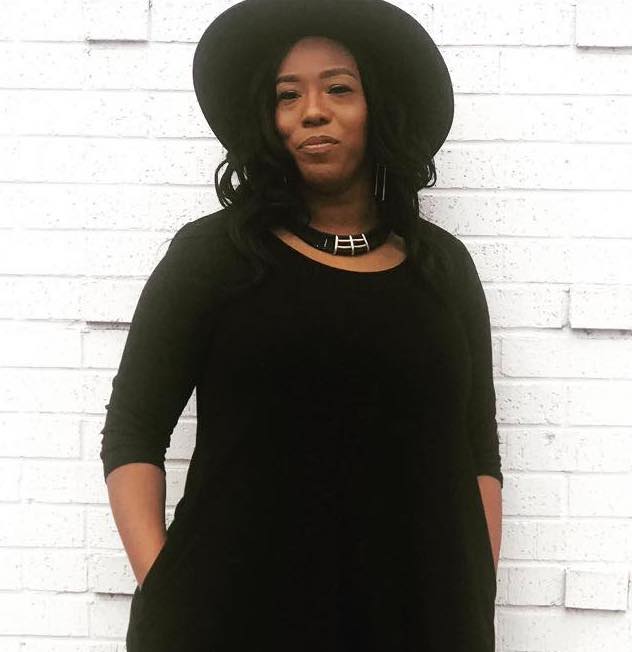
Evans is founder of Waffle Chic, a local food truck. There, she works to deliver classic Southern comfort food for the Waco public to enjoy. Her goal is to create community, which she continuously strives for by serving up fresh, mindful ingredients with a smile. She came up with the idea of her truck from her own personal experiences with single-motherhood.
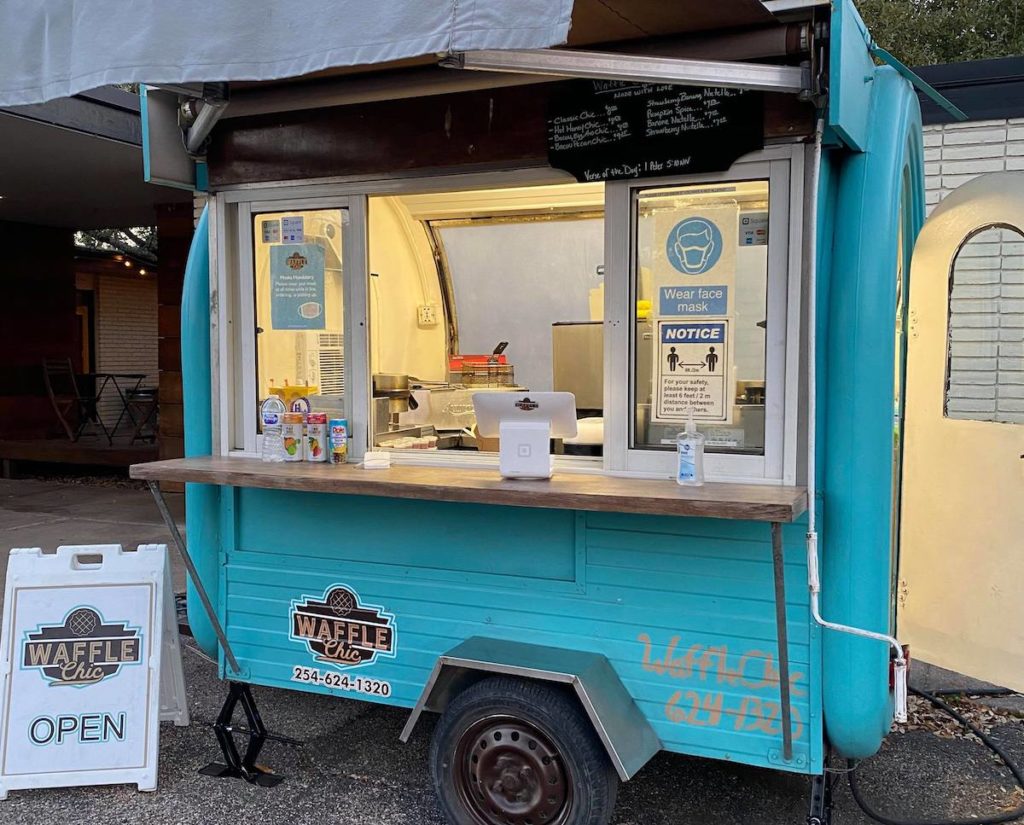
“The name Waffle Chic originates from me being a single-parent with my kids,” she said. “The waffle is kind of like the mom, and the chicken is the chicks, my little chicks.”
By selling chicken and waffles, Evans wanted to bring a fresh, new perspective to the food truck scene in Waco and expose the public to good, Southern cooking on the go. Inclusivity is a staple in her kitchen, and she strives to accommodate the needs of her customers every chance she gets.
“It’s healthier for those that are healthier, it’s still Southern for those that like Southern because I’m still using all the Southern spices. Kids can eat it, and older people can eat it, too,” Evans said.
To Evans, Waco is a booming city that has room for both big and small businesses. She also thinks Waco continuously fosters a wholesome sense of community that rivals small towns. Growth and connection are two factors that help drive the Waco community and lead to what she describes as outstanding community building.
“I don’t feel like we’re in competition. I just feel like we’re all growing with each other,” she said. “We’re a village here in Waco, and we’ve got plenty of giants who are willing to build empires and kingdoms with each other.”
Evans is heavily involved in programs and organizations within the Waco area, such as Cen-Tex African American Chamber of Commerce, Hispanic Chamber of Commerce, and Hewitt Chamber of Commerce. All of these organizations were instrumental in helping Waffle Chic get its start. Not only that, but Evans is also known to actively help out the homeless. Fueled by her faith and background, she hopes to give back to a community that gave so much to her.
“They’re really the ones experiencing hardship,” Evans said. “I just see them as family as well, and still to this day each of them will come to my truck, and they’ll come to just say hello.”
When it comes to describing how special Waco is, Evans had her own acronym to share.
“I could give Waco four words or phrases just by using the letters in its own name,” she said. “Waco is a wonderful, awesome community of outstanding people.”
By connecting food and community, Evans proves that not only does Waco have a variety of eateries to choose from, but it also is a city that is filled with people who inspire and prosper.
“I’ve lived here in Waco my whole life,” Evans said. “I don’t see myself living anywhere else.”
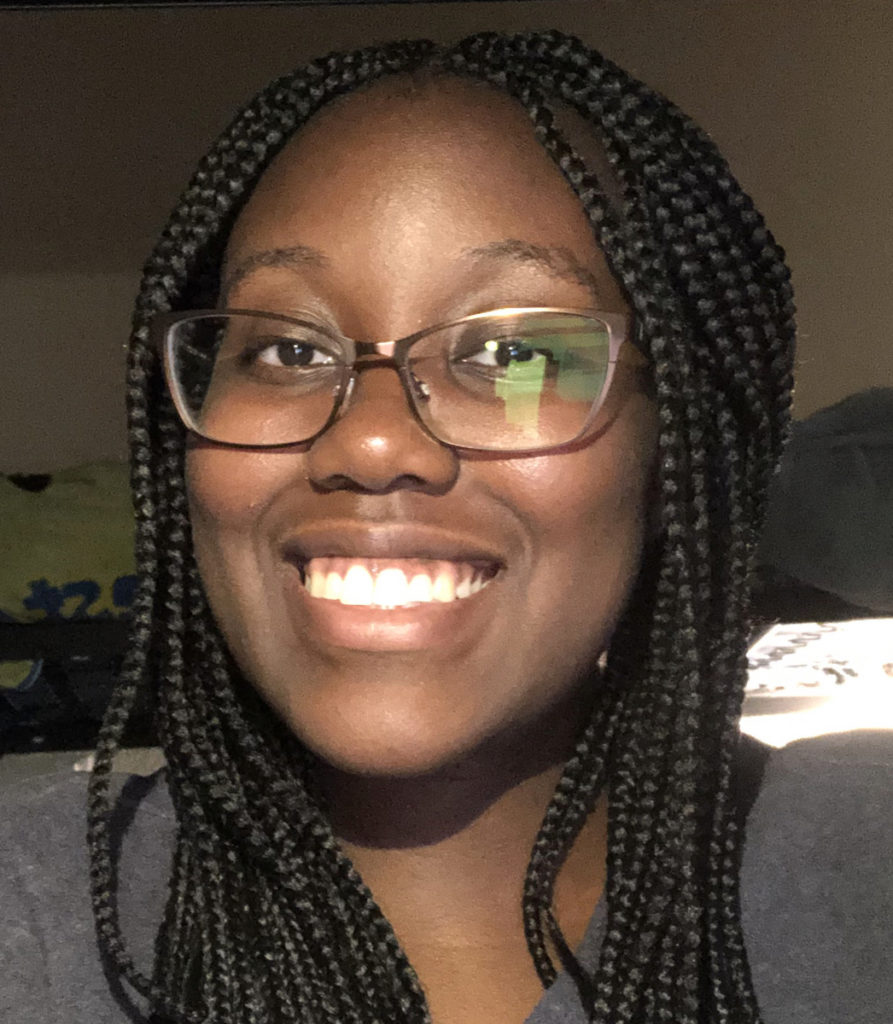
Skylla Mumana is a freshman journalism major at Baylor University from San Antonio.
The Act Locally Waco blog publishes posts with a connection to these aspirations for Waco. If you are interested in writing for the Act Locally Waco Blog, please email Ferrell Foster at [email protected].
In honor of Black History Month, we are featuring interviews with local Black community leaders. These pieces were written by Baylor University students from the Department of Journalism, Public Relations, and New Media. The students asked questions about what the leaders love about Waco, and we are excited to share their responses with you this month.
By Gi’erra Cottingham
Time does not always permit us to book a flight, pack a bag, and travel to experience foods around the world, but sometimes it comes to us. Two community leaders have brought Cambodian food to the heart of Waco. In 2016, Chevy and Mike DuBose introduced The Blasian Asian, an authentic Cambodian cuisine, in Union Hall.
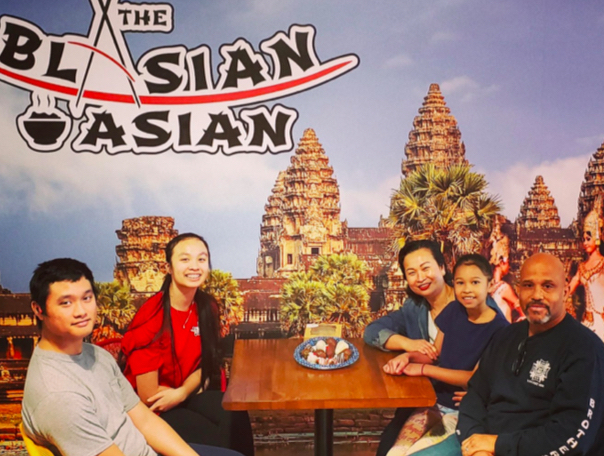
“The menu is 100% Cambodian food,” Mike said. The word Blasian comes from the combination of their race and ethnicity. Mike is Black, and Chevy is Cambodian. “Our baby is a combination of Black and Asian,” DuBose said — Blasian.
“Mrs. DuBose and I lived in Seattle for about 20 years where I was an aeronautical engineer, and she did aerospace repair. I accepted a job promotion in Waco, but when we got here, she was really craving Cambodian food,” Mike said. “Eventually, she started cooking for me. I’d share the food with my staff, and they highly encouraged her to invest in a food truck. Our business took off from there. We’ve now migrated from the food trailer of three years to a restaurant in Union Hall that we began in March” last year.
The couple’s determination to fulfill their mission in sharing what they love with the Waco community is appreciated among local Waconians. The Blasian Asian was voted “Best Food Truck 2019” and “Best Asian Food 2020.”
“My personal favorite dish is the garlic fried rice. There are two popular dishes on our menu: the garlic fried rice and the Blasian itself,” Mike said. “The Blasian has a large variety that includes chicken, beef, pork, noodles, and egg rolls, while the garlic fried rice has been voted the best in Waco. Most customers have commented that they were obligated to use soy sauce at other restaurants to increase the flavor and didn’t need it for ours.”
Due to the couple’s community involvement and leadership duties, Chevy’s availability to consistently cook in the kitchen is slim. She oversees the quality of the food as she’s the only one who knows each Cambodian dish intimately, but most of her time is spent preparing and making sure the food meets her expectations, while The Blasian Asian’s employees are trained to cook and present the dishes.
“Since we moved to Waco, my wife and I have been a part of community tasks. We are active members of the NAACP Waco chapter where we participate in meetings, functions, and events. We are also members of the African American Chamber of Commerce and the Hispanic Chamber of Commerce,” Mike said.
The Blasian Asian’s owners have persevered during COVID-19 and are hopeful that other small businesses do the same. The couple began their dream from simply sharing Cambodian food with friends and has made it thus far despite setbacks.
“The advice I would give to small businesses during the COVID-19 pandemic is to keep on. This is temporary,” Mike said. “We have a lot of support from the community during this time, but the most important thing to remember is to not give up and find ways to reduce costs without shutting down.”
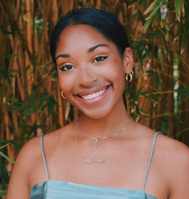
Gi’erra Cottingham is a freshman at Baylor University, majoring in broadcast journalism. She was born and raised in Houston where she attended Carnegie Vanguard High School. Her hobbies include being outdoors, spending time with family, and writing.
The Act Locally Waco blog publishes posts with a connection to these aspirations for Waco. If you are interested in writing for the Act Locally Waco Blog, please email Ferrell Foster at [email protected].
By Rev. Susan Finck
Because I come from a family of lawyers and almost became one myself, I am usually drawn to all things legal. But I must confess, when I received a little white card in the mail summoning me for jury duty, I was contemplating how I might avoid serving. How could I have enough time for sermon preparation? What about my other responsibilities? What if I got “stuck” on a horrible, violent case? I knew it was part of my responsibility of being a citizen, so I headed downtown, wrestling with my inner objections.

I was chosen first for the larger panel, and my interest and curiosity turned to concern as we were seated. I noticed the racial disparity in the room. The defendant was the only AfricanAmerican. Perhaps two of the 50 or so potential jurors might have been Hispanic or people of color. Everyone else was white: the attorneys, the judge — even the bailiff. (The room did not reflect our county: 55% white, 27% Hispanic, 15% Black.) “How does he feel?” I wondered, as I looked at the defendant.
My mind flashed back to all I had read about Waco’s troubled racial history, and the racial history in this country. From slavery, to reconstruction, then Jim Crow. The segregation that had been entrenched in our own community, that my older church members recall vividly. The phenomenon of mass incarceration throughout our country. “Will he be able to truly get a fair trial?” I wondered, as I looked at his court-appointed attorney. I know they are frequently overloaded with cases and often can’t provide the same high quality defense that money can buy.
Then I was chosen for what became an all-white jury of 12. It was the defendant’s fourth DUI, and he was arrested after swerving markedly while driving (without a license) and testing substantially over the legal blood alcohol limit. The prosecutor presented a video where we saw the car swerving, and we heard the officer’s respectful, appropriate interaction with the defendant. We saw documentation of the defendant’s blood alcohol level. Sadly, I voted for a guilty verdict.
After being seated in the courtroom once again, we heard information we had to consider when issuing the “punishment.” Here is where I agonized. The prosecution was recommending a sentence that could put him in prison the rest of his life, since he was an older man. I asked if there was a way that we could sentence the defendant to mandatory confinement in a rehab facility or other location where he could receive the medical/psychological intervention we all felt he needed. I asked about alternatives: programs to help him, rehabilitation. He had been sentenced to those before and had done well while in prison. The problem was when he would get out of prison, “family members couldn’t keep him from behind a wheel.”
It took us several hours to deliberate the “punishment phase.” Most of the jurors were ready to hand down the recommended sentence. I was overcome with the weightiness of our task. We would be responsible for sending a man away from his family and depriving him of his freedom. We also had a duty to protect society. There wasn’t a good solution. It was sad and hard — made harder by the racial dynamic.
“I need for us to ask ourselves the question,” I said. “If he was white, would we be taking this same course of action?” I got a mix of responses, all from the perspective of “color doesn’t matter.” One of the other jurors confronted me: “If he goes free, and you pick up the Trib and read where he kills a child, how are you going to feel?” Obviously we are weighing odds and probability. I changed my vote.
We were escorted back into the courtroom. His family filled two rows of the gallery, the only African-Americans present. I was praying as I looked around. Then, one of the older women caught my eye. It was like she read my thoughts, overhearing my prayer. For an extended moment, we were connected.
I’m not usually a cry-er. As much as I tried to fight it, and as much as I was embarrassed, I cried in the jury box that day. I cried for the family. I cried for the defendant. I cried for our history in Waco; and for “the system.” I cried from the weight of the decisions I had to participate in.
I came away from that experience with a deepening of a conviction that we need more attorneys in our county who are people of color. And jurors, especially jurors. Jury service pulled me out of my own self-focus and broadened my perspective, making me more passionate about the justice I say I believe in. I found many of my beliefs and biases challenged; I had to choose between a list of heartbreaking options. How “severe” was what he had done? How do we equate that with a number of years of someone’s life?
How did depriving him of his freedom balance with protecting society or even his own life?
If you get the little white card in the mail, I want to encourage you to think beyond how you might be inconvenienced. Jury service will cost your time and your mental and intellectual energy. You will have to find others to cover work and home responsibilities. Things will go undone. But it takes all of us to make our society work and work fairly.
The little white card may be your invitation to be faithful to your values or your God, if you are a person of faith. Instead of, “Oh, no, how can I get out of this?” What if you thought: “If I am called, I will willingly serve to do my part to witness for truth and justice. My voice, in dialogue with those of my fellow community members, is needed.”
Besides serving if you are called, I want to invite you to think of any Hispanic or Black young adults you know who might make good lawyers. Ask them if they’ve considered this path. Tell them you can see them in this role. Encourage. Plant that seed.
Finally, join Waco NAACP Black History Month Criminal Justice Series (on Zoom):
“Who Let George Zimmerman Go?: How Being a Juror Serves Justice,” 6:30-8 p.m., Feb. 22, free. One juror could have prevented George Zimmerman, the man who killed Trayvon Martin, from being acquitted. Yet, African Americans are routinely prevented from serving on jurors. Worse, many African Americans actively work to avoid jury duty. William Snowden, founder of The Juror Project, aims to eliminate both these problems.
“Breonna Taylor Could Have Gotten Justice: The Power of Grand Juries,” Feb. 28, 6:30-8 p.m., free. Had the members of the grand jury who heard the Breonna Taylor case known the power they had to call witnesses or issue subpoenas, the outcome might have been different. Award winning, board-certified Criminal Defense attorney Tyrone Moncriffe, explains the grand jury procedure, the power that jurors have, and why it is crucial that African Americans serve on them.
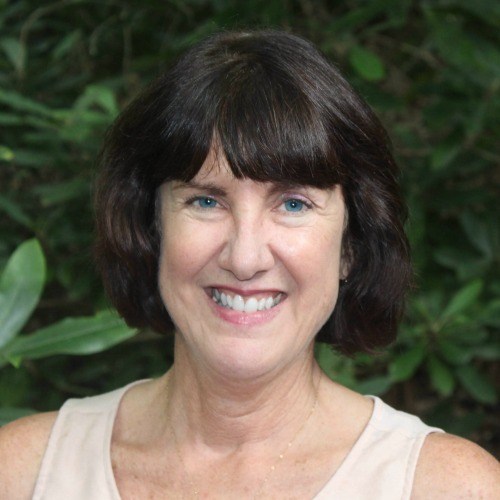
Rev. Susan Finck serves as the pastor of El Calvario Presbyterian Church in North Waco and a board member for Greater Waco Legal Services. She is passionate about literacy and education in our city, and encouraging opportunity for everyone to fulfill their callings. She and her husband, Dr. Bill Lockhart, a long-time instructor at McLennan Community College, have lived in Waco since 2001. They have four adult children and two grandchildren.
The Act Locally Waco blog publishes posts with a connection to these aspirations for Waco. If you are interested in writing for the Act Locally Waco Blog, please email Ferrell Foster at [email protected].
